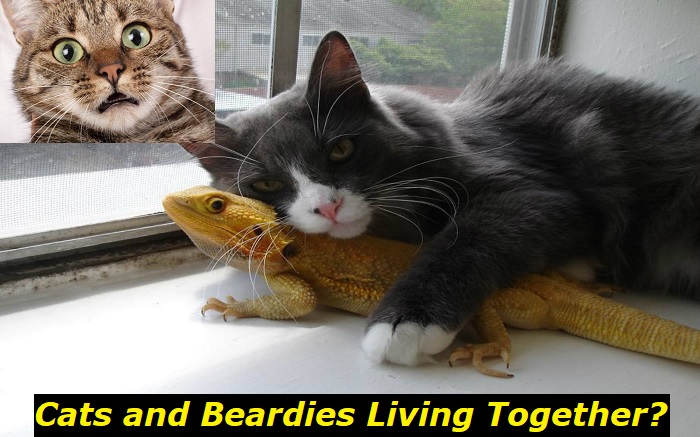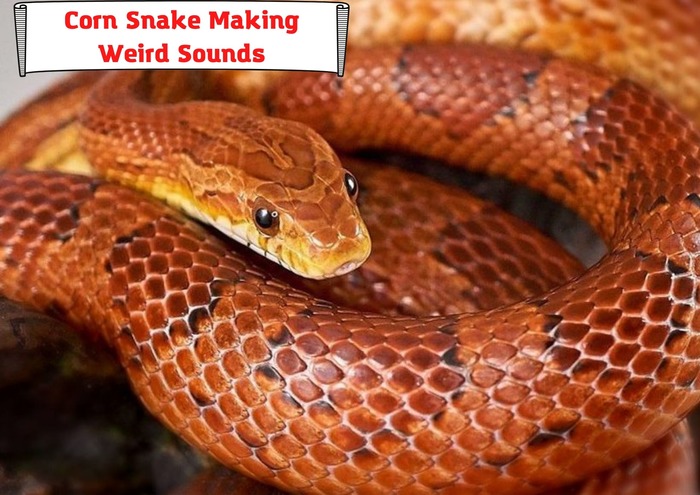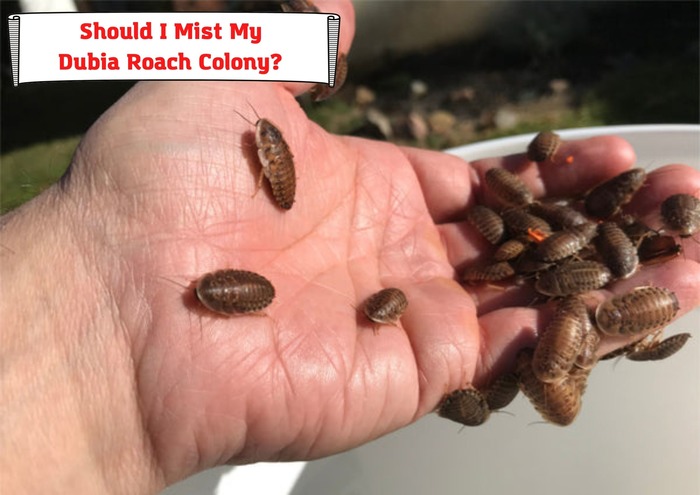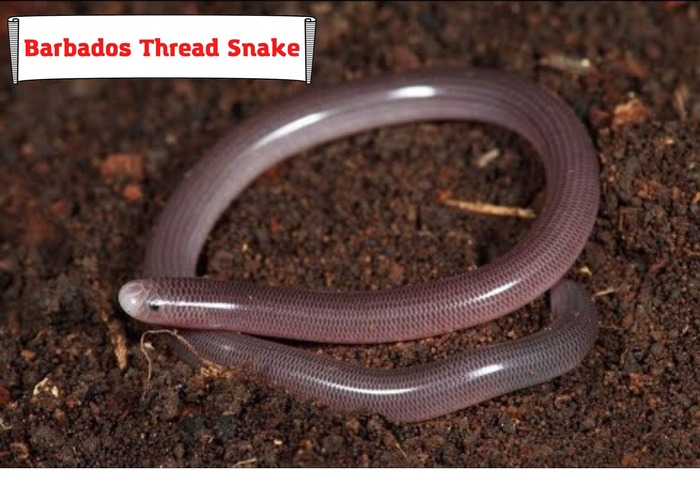It is one thing to keep a bearded dragon alone. Keeping a bearded dragon and a cat in the same house is a different thing altogether.
Since energetic cats, especially kittens and newly introduced cats, can bite the bearded dragon while they play together, many pet owners often wonder, “Are bearded dragons poisonous to cats?”

This article answers that question. It also discusses other risks associated with their continuous contact that you need to be aware of and how to handle any case of an infection.
Are Beardies Poisonous to Cats?
Whether bearded dragons are poisonous to cats is a growing concern among pet owners, and for good reasons. The simple answer is that bearded dragons are generally not poisonous to cats. But some things need to be considered.
They are indeed venomous, but their venoms are hardly a threat to cats and kittens. This is because bearded dragons are generally docile pets. Unlike cats that jump around and tend to be aggressive, beardies are usually peaceful, minding their business and having a good time in their enclosure. So, the probability of your bearded dragon biting your cat is very low.
But your cat could get sick from biting your bearded dragon. Bearded dragons are known to carry the bacteria Salmonella. This bacteria group is known to make people and even animals sick. Your cat can get it if it bites or makes other contact with the beardie’s body.
Although Salmonella causes an illness called salmonellosis, in many other instances, it is known to cause typhoid fever. Symptoms of illness that your cat may suffer may include extreme fatigue, diarrhea with blood or mucus, and a fever. You may also notice other symptoms like decreased and, in some cases, a total lack of appetite with your cat.
How Can Cats Get Salmonella from Bearded Dragons?
Remember that Salmonella is one of the numerous types of bacteria in the intestinal tracts of the bearded dragon. It is usually passed out in poops, but it may also be present on the skin of your bearded dragon.
Although your cat is less likely to bite the bearded dragon unless it is aggressive, you can be sure it will tap your beardie repeatedly out of curiosity. This is how it comes in contact with the Salmonella bacteria on your beardie’s skin. This bacterium is usually introduced into the cat’s system when it licks itself and its paws while trying to stay clean.
Another possibility is coming in contact with the poop of your bearded dragon. It is almost impossible for cats to touch poop as they are very clean animals. Unlike dogs that will eat their poop if left unsupervised, cats like to handle their business somewhere far away. And they do not like to come in contact with their poop.
But they love warm environments, which is something that the lighting system of your reptile’s enclosure has. It is not uncommon to find cats inside the beardie’s enclosure enjoying the warmth or on top of the enclosure with their bodies on the warm tops.
When they enter the enclosure to access the warmth, they surely come in contact with some micro particles of the bearded dragon’s poop. By doing so, they will inevitably get sick when bacteria enter their system.
Another common way is when they fall into the enclosure and land on the beardie’s poop. This is so because enclosure tops are not built to withstand the weight of bigger critters like cats.
Do Cats Hunt Bearded Dragons?
Domestic cats are less likely to have sharp predatory instincts than other cats in the wild; the fact remains that they are still natural hunters. However, domestic cats often see the beardie as a member of the household.
Many cat owners who keep beardies are stunned by how their cats and beardies get along so well, even spending time cuddling as they sunbathe in the morning. The peaceful nature of bearded dragons also makes this possible. At other times, they have been seen cuddling together in the enclosure.
If this is the case with your cat, you have nothing to worry about. But if your cat is new to the house or is a wild cat that you are trying to domesticate, there is a chance that it will hunt your bearded dragon. So, you want to pay attention to how they interact to determine the probability of an accident between them.
You also want to ensure that your cat learns to tolerate the beardie as you introduce the beardie to it. It is recommended that you secure the beardie in its enclosure whenever you are not around to supervise the cat.
What Should I Do If My Cat Bites My Bearded Dragon?
Although it is highly unlikely that your cat will bite your bearded dragon since they both display body language clearly, there is still a chance that your cat might bite your bearded dragon.
If this happens, what you want to do is to clean the wound with some antiseptic. All cats have bacteria in their mouth. These bacteria can cause tissue infections in the wounds they inflict on your beardie with a single bite.
You want to quickly eliminate the chances of bacterial infection by cleaning the wound with an antiseptic.
Another thing you want to do is to immediately call your vet and explain the situation. If it is a mere tear on the skin’s surface, it would still be best to clean the wounds.
If there is no need to see the vet, you want to place your beardie in its enclosure. Leave it in a warm area of its enclosure. You also want to ensure that it stays hydrated during this recovery process.
It would be risky to leave the cat unattended after attending to the wounds of your beardie. Remember that beardies usually carry the Salmonella bacteria on their skin. So, there is a chance your cat has introduced the bacteria into its mouth with the bite.
Although cats may recover from a possible Salmonella infection, sometimes, they may need some other supportive care, especially when they suffer a more serious stomach flu. In many instances, you can treat the cat with antibiotics. Still, the best approach to handling a cat experiencing serious symptoms of salmonella infection is to visit the pet clinic.
Can Bearded Dragons Come Under Stress from Cats?
Yes, bearded dragons can come under stress from cats. This is especially the case with kittens, as they are more energetic than adult cats. But adult cats can also stress your bearded dragon out by putting it on high alert as it paces around the enclosure.
Remember that while your home may not have the natural preys that cats hunt, they may enjoy the thrill of chasing just about anything that moves. Their interaction with your bearded dragon can bring it under stress.
You want to avoid this by putting your beardie safe in its enclosure and ensuring that the cat does not have access to the beardie’s enclosure.
You also want to keep your beardie within reach when it is not in the enclosure. This way, you can monitor it and ensure that your cat’s high energy does not stress your beardie.
What If My Cat Licks My Bearded Dragon?
Although a domestic cat is less likely to bite your bearded dragon, there is a high chance that it can lick it out of affection when they cuddle together.
You can expect them to cuddle because, for the bearded dragon, the cat’s body is a source of warmth as it is a warm-blooded animal.
Cats lick beardies while cuddling as a sign of affection from the cat, but it could lead to health problems for your beardie. You want to avoid this possibility at all costs. Cat’s saliva contains almost 200 species of bacteria. One prominent bacterium in a cat’s mouth is the Pasteurella multocida. These bacteria, if introduced to the skin of your beardie, can cause health issues for the dragon.
Remember that reptiles, including your beardie, have a poor immune system. They are often prone to infections. So, allowing your cat to come in contact with your beardie to the point where it licks the dragon is very risky and can lead to a bacterial infection.
If this happens, you want to wash your reptile’s skin clean of the saliva. You also want to observe it closely for the slightest sign of illness.
Once you notice that your bearded dragon is showing signs of illness, it would be best to see the vet for a medical examination and advice. Limiting the chances of both pets being together is also a great way to ensure that your beardie is safe.
Final Thoughts
Normally, cats get along well with bearded dragons, especially adult cats, since they are less energetic than kittens. But the chances that your cat will not lick your bearded dragon affectionately is slim.
And the health issues that can arise from such an expression of affection are bad for both of them. Limit their contact to save them both.
- Dubia Roach Egg Sack: How To Understand if It’s Healthy? - January 2, 2023
- How To Feed African Dwarf Frog While on Vacation? - December 26, 2022
- Baytril for Bearded Dragon: Here’s What You Should Know - December 19, 2022



